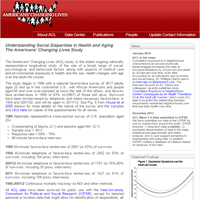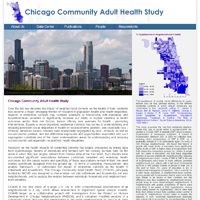Research
Over his career, House has conducted research on social determinants and disparities in health as well as a range of areas in social psychology, as evidenced in the publications section of this site. He has also contributed to the development of survey research as the Director of the Survey Research Center in the Institute for Social Research at the University of Michigan; with his research writings on and/ or using survey research methods; and with the development of several major studies which are publically available for secondary analysis:
 |
Americans' Changing Lives (ACL)The Americans' Changing Lives (ACL) study is the oldest ongoing nationally representative longitudinal study of the role of a broad range of social, psychological, and behavioral factors (along with aspects of medical care and environmental exposure) in health and the way health changes with age over the adult life course. The study began in 1986 with a national face-to-face survey of 3617 adults ages 25 and up in the continental U.S., with African Americans and people aged 60 and over over-sampled at twice the rate of the others, and face-to-face re-interviews in 1989 of 83% (n=2867) of those still alive. Survivors have been re-interviewed by telephone, and where necessary face-to-face, in 1994 and 2001/02, and will be again in 2011/12. See Fig. 6 from House et al 2005 (below) for more details on the nature of the survey and the samples and click here for copies of the questionnaires for all waves. |
 |
Changing Lives of Older Couples Study (CLOC)The Changing Lives of Older Couples Study (CLOC) is a multi-wave prospective study of spousal bereavement, designed and carried out by a research team including Camille Wortman, Ron Kessler, Jim House and Jim Lepkowski. Data were gathered from a two-stage area probability sample of 1,532 elderly married men and women from the Detroit Metropolitan Area. Initial face-to-face interviews were conducted between June 1987 and April 1988. Follow-up interviews of bereaved spouses and controls were conducted at 6, 12 and 48 months after the loss, and continued until 1993. While primarily a study of spousal bereavement, the dataset also includes a host of other psychosocial and biomedical variables. The combined dataset includes 1532 cases and over 3000 variables that cover every aspect of social, psychological, and physical functioning of older adults. The analysis and distribution of this data set is made possible by a grant from the National Institute on Aging to the University of Michigan (Randolph Nesse, PI). This website provides ready access to the data and codebooks as well as information on projects underway or completed. It is intended to encourage other researchers to make use of this remarkable resource. |
 |
Chicago Community Adult Health Study (CCAHS)The Chicago Community Adult Health Study (CCAHS) principally funded by NICHD was designed to characterize not only individuals and households but also neighborhoods, and to analyze the relation between individual / household and neighborhood - level variables. CCAHS is the only study of a large U.S. city to offer comprehensive assessments of all neighborhoods in a city, which allows researchers to implement spatial analytic models. CCAHS began as a collaborative project with investigators from the Project on Human Development in Chicago Neighborhoods (PHDCN), and it contained modified versions of a community survey that was first administered in the same neighborhoods by PHDCN in 1995 and systematic social observations (SSOs) of blocks within neighborhoods similar to ones that PHDCN conducted in 1995 on a larger number of blocks but in a sub-sample of only 80 neighborhoods. Thus, at the neighborhood-level CCAHS is already a panel data set, containing unique and extensive neighborhood measures that are available in few other studies. |
New Book
Beyond Obamacare:
Life, Death, and Social Policy


 Health care spending in the United States today is approaching 20 percent of GDP, yet levels of U.S. population health have been declining for decades relative to other wealthy and even some developing nations. How is it possible that the U.S., which spends more than any other nation on health care and insurance, now has a population markedly less healthy than those of many other nations? Sociologist and public health expert James S. House analyzes this paradoxical crisis, offering surprising new explanations for how and why the U.S. has fallen into this trap. In Beyond Obamacare, House shows that health care reforms, including the Affordable Care Act, cannot resolve this crisis because they do not focus on the underlying causes for the nation�s poor health outcomes, which are largely social, economic, environmental, psychological, and behavioral.
Health care spending in the United States today is approaching 20 percent of GDP, yet levels of U.S. population health have been declining for decades relative to other wealthy and even some developing nations. How is it possible that the U.S., which spends more than any other nation on health care and insurance, now has a population markedly less healthy than those of many other nations? Sociologist and public health expert James S. House analyzes this paradoxical crisis, offering surprising new explanations for how and why the U.S. has fallen into this trap. In Beyond Obamacare, House shows that health care reforms, including the Affordable Care Act, cannot resolve this crisis because they do not focus on the underlying causes for the nation�s poor health outcomes, which are largely social, economic, environmental, psychological, and behavioral.
Read more

